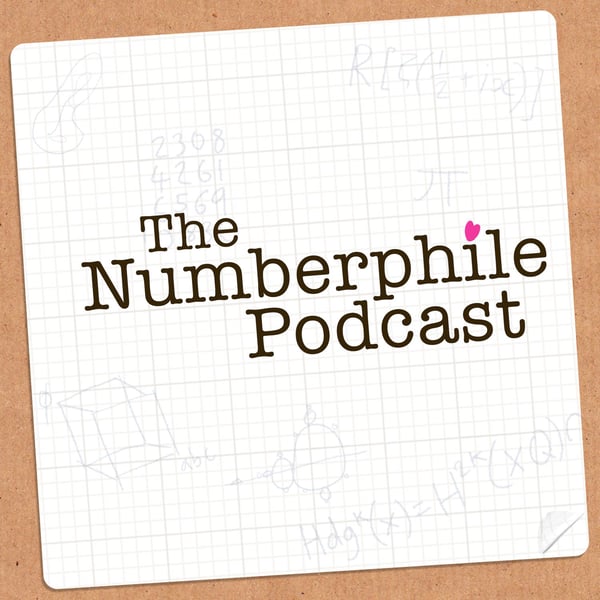Counting Crayons - with Po-Ling Loh
The Numberphile Podcast
Brady Haran
4.9 • 619 Ratings
🗓️ 14 December 2024
⏱️ 39 minutes
🧾️ Download transcript
Summary
Transcript
Click on a timestamp to play from that location
| 0:00.0 | Welcome to the Numberphile podcast. |
| 0:07.3 | Today's guest is Po Ling Lowe. |
| 0:09.9 | She's an American theoretical statistician based in the UK. |
| 0:14.2 | She's at the University of Cambridge. |
| 0:16.1 | And what she's doing is some interesting stuff in the world of higher dimensional statistics |
| 0:20.8 | and differential |
| 0:22.5 | privacy. You don't know what that is? Don't worry, neither did I. We'll get to that. But let's start at the |
| 0:29.2 | beginning. So let's start with you then. Where in the world were you born? Where are you from? Well, when people ask me where I'm from, I say Madison, Wisconsin, because it's easier to say that. In reality, I was born near New York City. So my, but my older brother was born in Madison because my parents had already settled down there. But my father went on sabbatical to New York City for about a year, which is when I was born. It was a quirk of work that saw you born there. Right, right. Madison, Wisconsin. I've never been there. What's Madison, Wisconsin like? It's a very, well, it's what in America they would call it a college town, Midwestern college town. So he's a very big university there with like 50,000 students. And then outside of that, |
| 1:13.1 | well, it's the capital of the state. So there are some lawmakers. And then there are just lots of |
| 1:17.4 | cows and lots of empty space. And what was childhood like? Like what were you like as a girl? |
| 1:22.3 | I was pretty shy and awkward, I think. I mean, I studied a lot. So my father is a statistics professor. My mother also had her degree in mathematics, but then decided to become a full-time homemaker. So she wanted to make sure that her three kids were very good at math. So that's basically what I did. I mean, I just studied a lot and worked at it. You had no |
| 1:44.5 | choice in this by the same. No, I didn't. I mean, I was the youngest of three, so I really had no choice. Are your two older siblings, mathy type people? Yeah, yeah, yeah. Also, both your parents and all three kids have become mathy people. Yeah, and I mean, when I was growing up, there were lots of other parents, especially parents of Asian classmates who had asked my mom, like, how do you do it? |
| 2:05.4 | But looking back, I mean, she did it because that was what her full-time mission was to make sure that we were all very good at math. |
| 2:11.1 | And she stayed at home and made sure that that happened. |
| 2:13.2 | So what would it look like in your house when you were little kids? |
| 2:16.3 | Would mother be sitting you down with graph paper and pencils and drilling math into you? Well, I mean, so one thing I remember a lot was like when I was a little child. I mean, I don't know how old I was, but let's say I was like three or something, right? And she would take out the crayon box and we were not going to color. We were going to count crayons. going to count crayons. So every time the crayon box came out, it was to count the crayons. Another thing she |
| 2:38.8 | liked to do, I was probably a bit older, was to make change with money, right? So to understand |
| 2:43.7 | what do the different coins mean? So she would sit me down with my two brothers. So one brother is |
| 2:48.4 | two and a half years older than me. The other is five years older than me. And we all got equal amounts of money. And we were supposed to exchange coins. And what happened was at the end of the game, my second brother would have the exact same amount of money he started with. My older brother would have twice as much money as what he started with and I would have nothing. Because the negotiation would be, you know, my second brother would be like, okay, so here's a nickel, |
| 3:09.0 | give me five pennies. |
| 3:10.1 | I'm like, okay. |
| 3:10.6 | Then my oldest brother would say, well, you know, so here's a penny, but it's really, really valuable. So, you know, it's worth a quarter. Give me the quarter. And I'd be like, okay. And later I take the valuable penny and I try to give it back to. |
... |
Please login to see the full transcript.
Disclaimer: The podcast and artwork embedded on this page are from Brady Haran, and are the property of its owner and not affiliated with or endorsed by Tapesearch.
Generated transcripts are the property of Brady Haran and are distributed freely under the Fair Use doctrine. Transcripts generated by Tapesearch are not guaranteed to be accurate.
Copyright © Tapesearch 2025.

